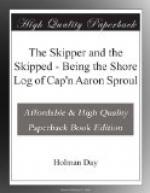Hiram clenched his cigar more firmly in his teeth, leaned over carefully, and picked up the recumbent P.T.
He tucked the rooster under his arm and started off.
“Let’s go ’crost back lots,” he advised. “What people don’t see and don’t know about won’t hurt ’em, and that includes your wife and mine.
“It won’t be no kind of a hen-fight, you understand,” Hiram chatted as they walked, “’cause that compost-heap scratcher won’t last so long as old Brown stayed in heaven. For P.T., here, it will be jest bristle, shuffle, one, two—brad through each eye, and—’Cock-a-doodle-doo!’ All over! But it will give you a chance to see some of his leg-work, and a touch or two of his fancy spurrin’—and then you can take old Sculch-scratcher by the legs and hold him up and inform Bat Reeves that he can come and claim property. It’s his own game—and we’re playin’ it! There ain’t any chance for law where one rooster comes over into another rooster’s yard and gets done up. Moral: Keep roosters in where the lightnin’ won’t strike ’em.”
When they topped Hickory Hill they had a survey of Cap’n Sproul’s acres. Here and there on the brown mould of his garden behind the big barn were scattered yellow and gray specks.
“There they be, blast ’em to fury!” growled the Cap’n.
His eyes then wandered farther, as though seeking something familiar, and he clutched the showman’s arm as they walked along.
“And there’s Bat Reeves’s gray hoss hitched in the widder’s dooryard.”
“Mebbe he’ll wait and have fricasseed rooster for dinner,” suggested Hiram, grimly. “That’s all his rooster’ll be good for in fifteen minutes.”
“It would be the devil and repeat for us if the widder’s rooster should lick—and Bat Reeves standin’ and lookin’ on,” suggested the Cap’n, bodingly.
Hiram stopped short, looked this faltering faint-heart all over from head to heel with withering scorn, and demanded: “Ain’t you got sportin’ blood enough to know the difference between a high-station game-cock and that old bow-legged Mormon down there scratchin’ your garden-seeds?”
“Well,” replied the Cap’n, rather surlily, “I ain’t to blame for what I don’t know about, and I don’t know about hens, and I don’t want to know. But I do know that he’s more’n twice as big as your rooster, and he’s had exercise enough in my garden this spring to be more’n twice as strong. All is, don’t lay it to me not warnin’ you, if you lose your thousand-dollar hen!”
“Don’t you wear your voice out tryin’ to tell me about my business in the hen-fightin’ line,” snapped the showman, fondly “huggling” P.T. more closely under his arm. “This is where size don’t count. It’s skill. There won’t be enough to call it a scrap.”
They made a detour through the Sproul orchard to avoid possible observation by Louada Murilla, the Cap’n’s wife, and by so doing showed themselves plainly to any one who might be looking that way from the widow’s premises. This was a part of the showman’s plan. He hoped to attract Reeves’s attention. He did. They saw him peering under his palm from the shed door, evidently suspecting that this combination of his two chief foes meant something sinister. He came out of the shed and walked down toward the fence when he saw them headed for the garden.




